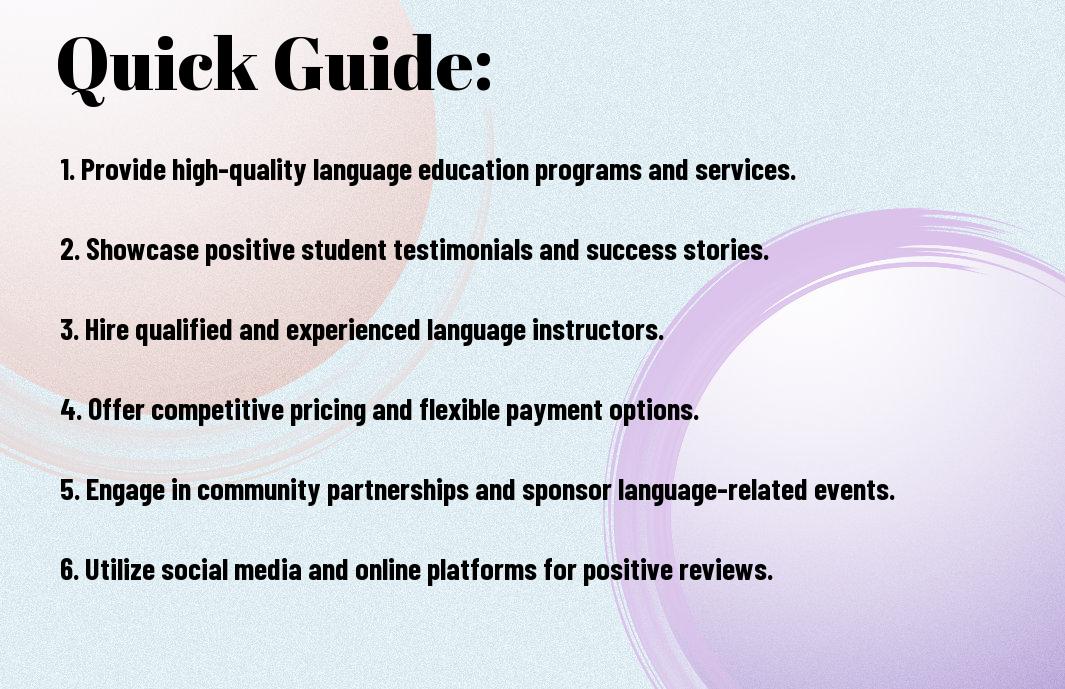Language schools operate in a highly competitive market where trust and credibility are imperative for success. In such a crowded marketplace, it is crucial for language schools to establish a solid reputation that sets them apart from the competition. Building trust with potential students and their families is crucial for attracting new business and retaining existing clients. Without trust and credibility, even the most exceptional language programs may struggle to gain traction in the market.
One of the most important aspects of building trust and credibility for your language school is maintaining transparency in all your interactions. Be honest about your programs, instructors, and facilities to set realistic expectations for your students. Additionally, showcasing positive reviews, testimonials, and success stories from past students can help to build credibility and demonstrate the quality of your language school.
For more insights on establishing trust and credibility for your language school, check out this comprehensive guide on How to Build Trust and Credibility in Your Online Marketplace. By following these strategies and staying focused on providing high-quality language education, your school can stand out in a competitive market and attract a steady stream of students seeking to enhance their language skills.

Key Takeaways:
- Deliver on Promises: Consistently deliver high-quality language education that meets or exceeds students’ expectations.
- Transparent Communication: Build trust by being open and transparent with students, parents, and staff about all aspects of your language school.
- Qualified Instructors: Hire qualified, experienced, and certified language instructors to ensure the credibility of your school.
- Positive Word of Mouth: Encourage satisfied students to share their positive experiences with others, helping to build credibility through word of mouth.
- Showcase Success Stories: Highlight success stories of students who have benefitted from your language programs to showcase the school’s effectiveness.
- Engage with the Community: Get involved in the local community through events, partnerships, and collaborations to build trust and credibility.
- Continuous Improvement: Strive for continuous improvement by seeking feedback from students and implementing changes based on their suggestions to show dedication to excellence.

Understanding the Education Market Dynamics
Types of Language Schools and Their Market Position
Any language school looking to establish trust and credibility in a competitive market must first understand the different types of language schools and their market position. Language schools can range from traditional brick-and-mortar institutions to online platforms, each catering to different segments of the market. Recognizing the unique positioning of each type of school is crucial in developing a competitive edge.
| Type | Market Position |
| Traditional Language Schools | Established reputation, face-to-face interaction |
| Online Language Platforms | Convenience, flexibility, technology-driven |
| Specialized Language Institutes | Niche market targeting, expert-level courses |
| Community Language Programs | Local engagement, cultural immersion |
| Corporate Language Training | Customized programs, business-oriented |
Some language schools may find success by combining elements from different types to cater to varied consumer preferences. Recognizing the strengths and weaknesses of each type can help language schools position themselves effectively in the market.
Factors Influencing Consumer Choices in Language Education
Clearly understanding the factors that influence consumer choices in language education is paramount for language schools striving to build trust and credibility. Consumer preferences, budget constraints, educational goals, and learning styles all play a significant role in the decision-making process. Assume that a one-size-fits-all approach will not appeal to all segments of the market.
- Consumer preferences vary based on factors such as location, class size, teaching methodology, and extracurricular activities.
- Budget constraints may dictate whether consumers opt for traditional language schools, online platforms, or more affordable community programs.
- Educational goals ranging from leisurely language acquisition to career advancement influence the choice of language school and program.
- Learning styles such as auditory, visual, kinesthetic, or a combination thereof, impact how consumers perceive language learning experiences.
Assume that language schools must conduct market research and gather feedback from existing and potential customers to tailor their offerings to meet the diverse needs of consumers. By understanding the nuances of consumer decision-making, language schools can adapt their strategies to attract and retain a loyal clientele.
Competitive Analysis
Education markets are highly competitive, requiring language schools to conduct thorough competitive analyses to identify their strengths, weaknesses, opportunities, and threats. Consumer feedback, pricing strategies, course offerings, faculty expertise, and marketing tactics all contribute to a language school’s competitive position in the market.
Education market dynamics are influenced by various external factors, including changing demographics, technological advancements, economic conditions, and global trends. Language schools must stay abreast of these developments to capitalize on opportunities for growth while mitigating potential threats to their business.
Laying the Foundation: Your School’s Identity
Defining Your Unique Value Proposition
For a language school to stand out in a competitive market, it is necessary to define a unique value proposition that sets it apart from the rest. With so many language schools to choose from, potential students need a compelling reason to choose yours. Consider what makes your school different – is it a specialized teaching approach, innovative learning methods, a focus on cultural immersion, or perhaps a convenient location? Identifying your unique selling points will help you attract the right students who resonate with your school’s values and offerings.
When crafting your unique value proposition, emphasize how your school addresses the specific needs and desires of your target audience. Are you catering to busy professionals looking to improve their language skills for career advancement? Or are you focused on providing a nurturing environment for young learners to develop proficiency in a new language? The key is to communicate clearly why your school is the best choice for prospective students seeking language education.
By honing in on your unique value proposition, you can differentiate your language school in a crowded market and build trust with potential students. The more precisely you define what sets your school apart, the easier it will be to create targeted marketing messages that resonate with your audience and attract new enrolments.
Tips for Articulating Your School’s Values and Mission
Schools that clearly articulate their values and mission create a strong foundation for building trust and credibility. This involves defining the guiding principles and beliefs that drive your language school and reflecting them in all aspects of your operations, from curriculum development to student interactions.
- Identify core values that align with your school’s vision and goals.
- Communicate your mission statement clearly and consistently to staff, students, and the community.
- Integrate your values and mission into everyday practices and decision-making processes. The more your school demonstrates its commitment to its core beliefs, the more trust it will earn from students and parents alike.
Branding Elements that Communicate Trust
If trust is the currency of credibility, then branding elements play a crucial role in communicating this valuable asset to your audience. With the right branding strategy, your language school can convey professionalism, reliability, and a commitment to excellence, all of which are necessary for building trust with prospective students and parents.
When developing your branding elements, consider how your logo, color palette, website design, and marketing materials reflect the values and identity of your language school. Trust is built on consistency, so ensure that your branding is cohesive across all touchpoints to create a strong and memorable impression on your target audience.
Developing a Comprehensive Curriculum
All language schools strive to offer a curriculum that meets the needs and expectations of their students. When developing a comprehensive curriculum, several factors need to be taken into consideration. First and foremost, it is imperative to understand the target audience’s proficiency level and learning objectives. This will help in designing courses that are tailored to meet their specific needs. Additionally, incorporating a variety of teaching methodologies and resources can help keep the classes engaging and effective. Another important factor to consider is regularly evaluating and updating the curriculum to ensure it remains relevant and in line with the latest language trends and developments.
Factors to Consider for Course Development
- Target audience proficiency and learning objectives
- Teaching methodologies and resources
- Regular curriculum evaluation and updates
Thorough consideration of these factors can lead to the development of a curriculum that is dynamic, effective, and attractive to students, ultimately enhancing trust and credibility for the language school.
The Pros and Cons of Varied Language Programs
| Pros | Cons |
| Increased student engagement | Complex logistics |
| Diversified revenue streams | Resource-intensive |
| Appeal to a broader audience | Quality control challenges |
Curriculum development should carefully weigh the pros and cons of offering varied language programs. While diversifying the programs can lead to increased student engagement and appeal to a broader audience, it also comes with challenges such as complex logistics, resource-intensive requirements, and quality control issues. Thus, it is crucial to strike a balance that maximizes the benefits while mitigating the drawbacks.
Integrating Cultural Components for a Well-Rounded Approach
Now, integrating cultural components into the curriculum can greatly enhance the learning experience for students. By immersing students in the culture of the language they are learning, they gain a deeper understanding and appreciation for the language. Additionally, cultural components can help break down barriers and stereotypes, creating a more diverse learning environment. Moreover, incorporating cultural elements can increase motivation and interest in learning the language, as students see a real-world connection to what they are studying. Now, the integration of cultural components is not without its challenges. It requires careful planning and consideration to ensure that cultural elements are incorporated in a respectful and meaningful way. Language schools need to strike a balance between language instruction and cultural immersion to create a well-rounded educational experience for their students.
Integrating Cultural Components for a Well-Rounded Approach
Components such as cultural events, guest speakers, and cultural excursions can provide valuable opportunities for students to engage with the language in real-life contexts. By immersing students in the culture of the language they are learning, they gain a deeper understanding and appreciation for the language. This holistic approach prepares students for real-life interactions and helps build a deeper connection to the language and its speakers.
Attracting and Retaining Quality Educators
Not only is it crucial for a language school to have a solid curriculum and effective teaching methods, but it is equally important to have qualified and dedicated language instructors. Recruiting and retaining top-quality educators can significantly impact the reputation and success of a language school in a competitive market. To ensure a strong team of language educators, schools must implement effective strategies for attracting and retaining top talent.
Steps for Recruiting Qualified Language Instructors
An vital step in recruiting qualified language instructors is to clearly define the qualifications and characteristics that the school is looking for in potential candidates. This can include fluency in the target language, teaching experience, relevant certifications, and a passion for language education. Schools can then promote job listings on relevant platforms, attend job fairs, collaborate with language education institutions, and utilize social media to reach a wider pool of potential candidates. Conducting thorough interviews and reference checks can help in selecting the best candidates for the positions.
Tips for Supporting and Retaining Top Teaching Talent
Recruiting and hiring top teaching talent is only the first step; retaining them is equally important. Supporting language instructors through ongoing professional development opportunities, mentoring programs, and recognition for their achievements can contribute to their job satisfaction and long-term commitment to the school. Providing a positive work environment, opportunities for career growth, and competitive compensation and benefits can also help in retaining top teaching talent. Any issues or concerns raised by the instructors should be addressed promptly to ensure a positive and supportive workplace atmosphere.
- Professional development opportunities
- Mentoring programs
- Recognition for achievements
Building a Continued Education Culture for Staff
Staff members play a crucial role in the success of a language school, and investing in their continued education is vital for their professional growth and the overall quality of education offered. Creating a culture that encourages staff members to pursue further training, attend conferences, and participate in workshops can enhance their skills and keep them motivated. Offering incentives such as tuition reimbursement, study leave, and opportunities to present at conferences can further support a culture of continued education among the staff. To build a strong foundation for continued education, language schools can establish partnerships with reputable institutions, provide access to online resources and training modules, and encourage collaborative learning among staff members. By prioritizing staff development and creating a supportive learning environment, language schools can attract and retain top teaching talent, ultimately enhancing their reputation and competitiveness in the market.
Facilities and Learning Environment
Designing Spaces that Enhance Learning and Comfort
Keep in mind that the design of your language school plays a crucial role in creating a conducive environment for learning. The layout of classrooms, common areas, and study spaces should be carefully planned to promote interaction, collaboration, and concentration. Consider incorporating elements of nature, such as natural light and greenery, to create a calming atmosphere that encourages creativity and focus.
Lighting, acoustics, and temperature control are also imperative factors to consider when designing your school’s spaces. Proper lighting can reduce eye strain and improve alertness, while good acoustics can minimize distractions and enhance communication. Additionally, maintaining a comfortable temperature ensures that students can focus on their studies without being too hot or too cold.
Comfortable furniture and ergonomic design are key components in creating a learning environment that promotes productivity and well-being. Invest in quality desks, chairs, and other furniture that support good posture and allow students to study for extended periods without discomfort. Be mindful of, a well-designed space not only enhances learning but also contributes to the overall satisfaction and retention of your students.
Incorporating Technology in the Classroom for Effective Learning
You can enhance the learning experience at your language school by integrating technology into the classroom. Interactive whiteboards, multimedia resources, language learning software, and online resources can make lessons more engaging and effective. Technology can also provide personalized learning experiences, allowing students to progress at their own pace and focus on areas where they need improvement.
Designing a tech-friendly classroom involves more than just having the right gadgets. It’s about using technology strategically to create dynamic and interactive learning experiences. Encourage teachers to use a variety of tech tools to deliver lessons, engage students, and provide real-time feedback. By incorporating technology effectively, you can keep your language school at the forefront of modern educational practices.
Technology in the classroom can revolutionize the way students learn languages. By leveraging online platforms, apps, and software, language schools can offer interactive lessons, virtual language labs, and real-time communication with native speakers. Embracing technology not only enhances the learning experience but also prepares students for the digital demands of the modern world.
Maintaining Safety and Cleanliness as Trust Factors
- Safety measures should be a top priority in your language school to ensure the well-being of students and staff. Implement strict safety protocols, conduct regular inspections, and provide necessary training to handle emergencies.
- Cleanliness is imperative for creating a hygienic and welcoming environment. Regular cleaning schedules, proper waste management, and hygiene protocols should be in place to maintain a clean and tidy space.
Some language schools may overlook the importance of safety and cleanliness, but these factors are critical in building trust and credibility with students, parents, and staff. Any lapse in safety or hygiene standards can have a negative impact on your school’s reputation and student satisfaction.
Student-Centric Services and Support
Establishing Trust Through Student Services
Support An imperative aspect of building trust and credibility for your language school is to provide exceptional student services. By offering personalized assistance and support, you can demonstrate your commitment to the success and satisfaction of your students. Whether it’s helping them navigate enrollment processes, providing academic guidance, or offering counseling services, going the extra mile can make a significant difference in how your school is perceived.
| Benefits | Challenges |
| Increased student satisfaction | Resource-intensive |
| Enhanced reputation | Training staff for support |
A Step-by-Step Approach to Exceptional Customer Care
On the journey to building trust through exceptional customer care, it is crucial to have a systematic approach in place. This means ensuring that every interaction with students is positive and productive. From the first inquiry to post-graduation support, each touchpoint should be carefully designed to exceed student expectations and build long-lasting relationships.
| Key Steps | Benefits |
| Training staff for customer service | Improved student retention |
| Regular feedback collection | Enhanced student loyalty |
Another significant element of exceptional customer care is to be proactive in addressing student needs and concerns. By anticipating potential issues and providing timely solutions, you can show students that their well-being is a top priority for your language school. This proactive approach can help prevent small problems from escalating and lead to a more positive overall experience for students.
Creating Community Through Extracurricular Activities
There’s more to trust and credibility than just academic success. Creating a sense of community through extracurricular activities can help create a supportive and engaging environment for your students. By organizing events, workshops, and social gatherings, you can encourage students to bond with each other and feel connected to the school beyond the classroom.
Services should also be tailored to meet the diverse needs of your student body. Providing additional resources such as language exchange programs, career counseling, or cultural immersion opportunities can further enhance the overall student experience and set your language school apart from competitors.
Strategic Marketing Efforts
Despite the increasing competition in the language school industry, there are strategic marketing efforts that can help your institution stand out and build trust and credibility.
Brand Awareness and Outreach
Awareness is key in attracting students to your language school. Implementing a comprehensive brand awareness strategy is crucial. This can include creating engaging content on social media platforms, collaborating with influencers in the language learning niche, and participating in language-related events and workshops. By consistently promoting your school’s unique selling points and showcasing success stories of your students, you can increase visibility and attract potential learners.
Moreover, establishing partnerships with local businesses, universities, and organizations can expand your reach and elevate your school’s reputation. By offering language classes or workshops to employees or students of these institutions, you can tap into a ready-made audience and increase brand awareness within the community.
Utilizing digital marketing techniques such as search engine optimization (SEO) and targeted online advertising can also boost your brand awareness efforts. By appearing in relevant search results and reaching out to potential students through online ads, you can increase visibility and attract quality leads to your language school.
Reputation Management
Community perception plays a significant role in shaping the reputation of your language school. Engaging with the local community through outreach programs, cultural events, and language exchange activities can help create a positive reputation. By becoming an active contributor to the community, your school will be viewed as a trusted institution dedicated to linguistic and cultural education.
Reputation management involves not only maintaining a positive image within the local community but also responding effectively to feedback and reviews online. Monitoring review platforms and social media channels to address any concerns or negative feedback in a timely and professional manner is necessary. By showcasing your commitment to student satisfaction and continuous improvement, you can strengthen trust and credibility in your language school.
Additionally, leveraging positive testimonials and success stories from current and past students can be a powerful tool in reputation management. By highlighting the achievements and experiences of your students, you can showcase the effectiveness of your language programs and build trust among potential learners.
Tips for Effective Public Relations and Advertising
Assuming a proactive approach to public relations and advertising can enhance the visibility and credibility of your language school. Implementing targeted public relations campaigns that focus on educational partnerships, student achievements, and faculty expertise can help position your school as a reputable institution in the language learning industry.
- Press Releases: Distribute press releases highlighting key milestones, partnerships, or events at your language school to local media outlets and online platforms.
- Guest Speaking Engagements: Offer faculty members or language experts as guest speakers at relevant conferences, workshops, or community events to showcase your school’s expertise and attract potential students.
- Industry Accolades: Submit your language school for industry awards and recognitions to demonstrate excellence and credibility to a wider audience.
Assuming a proactive approach to public relations and advertising can enhance the visibility and credibility of your language school. Implementing targeted public relations campaigns that focus on educational partnerships, student achievements, and faculty expertise can help position your school as a reputable institution in the language learning industry.
Crisis Management
It is crucial for language schools to have a robust crisis management plan in place to address any unforeseen challenges or negative publicity. Be prepared to respond swiftly and transparently to any crisis situations, whether they involve student issues, faculty controversies, or external events that may impact your school’s reputation. By proactively addressing and resolving crises, you can mitigate potential damage and maintain trust and credibility within your student community and beyond.

Measuring Success and Nurturing Improvement
Unlike other businesses, language schools face unique challenges in establishing trust and credibility in a competitive market. As highlighted in Innovative Marketing Strategies for Language Schools, incorporating a mix of traditional and digital marketing tactics is crucial. But how can language school owners measure success and continuously improve to build trust and credibility?
Quantitative and Qualitative Metrics for Trust and Credibility
Metrics play a critical role in assessing the effectiveness of your language school’s strategies. Quantitative metrics such as website traffic, lead conversion rates, and student retention rates provide valuable data on performance. On the other hand, qualitative metrics like student testimonials, online reviews, and referrals offer insights into the satisfaction levels and reputation of your school. By analyzing both quantitative and qualitative metrics, language school owners can gain a comprehensive understanding of their strengths and areas for improvement.
The Importance of Feedback Loops
For language schools, establishing feedback loops is crucial for helping with continuous improvement. Feedback from students, parents, and teachers can reveal areas where the school excels and areas that require attention. By actively seeking and listening to feedback, language school owners can address issues promptly and demonstrate a commitment to enhancing the learning experience. Implementing a structured feedback system ensures that improvements are made based on real-time insights, contributing to the overall trust and credibility of the school.
A well-designed feedback loop not only captures external perspectives but also encourages internal reflection and collaboration. Language school staff and administrators can use feedback to identify training needs, streamline processes, and enhance communication. By creating a culture of feedback and continuous improvement, language schools can adapt to ever-changing market demands and maintain a competitive edge.
Continuous Improvement Strategies
Continuous improvement is a journey that requires a systematic approach and a dedication to excellence. Language school owners can implement strategies such as regular performance reviews, professional development opportunities, and technology upgrades to drive improvement. By setting clear goals, tracking progress, and celebrating achievements, language schools can create a culture of excellence and innovation.
Quantitative data on student outcomes, teacher performance, and business metrics can guide continuous improvement efforts by providing concrete benchmarks for success. By analyzing trends and identifying patterns, language school owners can make informed decisions to enhance the overall quality of their programs and services.
Importance of embracing a growth mindset and a willingness to adapt to change cannot be overstated in the competitive landscape of language education. By prioritizing continuous improvement and leveraging feedback loops, language schools can build trust and credibility that differentiate them from competitors and attract students seeking a high-quality learning experience.
Building Partnerships and Alliances
Collaborating with Local Businesses and Educational Institutions
Your language school can enhance its credibility and reach by collaborating with local businesses and educational institutions. By partnering with local companies, you can offer language training programs to their employees, creating a win-win situation where businesses invest in their staff’s development while bringing you a new stream of students. Similarly, forming partnerships with schools, colleges, and universities can give you access to a wider network of potential students. These collaborations not only help in attracting new students but also establish your school as a respected institution in the community.
International Partnerships and Language Programs
To expand your reach beyond local boundaries, consider forging international partnerships and offering specialized language programs. An international partnership with a reputable foreign language school can open up opportunities for student exchange programs, joint certifications, and collaborative research projects. By offering unique language programs tailored to specific industries or regions, you can attract students looking for specialized language training. These initiatives not only add prestige to your school but also broaden your global presence and reputation.
When establishing international partnerships, it is crucial to conduct thorough research and due diligence to ensure that the collaboration aligns with your school’s mission and values. Building strong relationships with partner institutions requires clear communication, mutual respect, and a focus on creating valuable opportunities for students. By selecting the right partners and designing innovative language programs, your school can position itself as a leading provider of language education on a global scale.
Leveraging Alumni Networks
Alliances with your alumni can be a powerful tool in building trust and credibility for your language school. Engaging with former students not only strengthens the sense of community and loyalty but also creates opportunities for mentorship, networking, and referrals. Alumni who have had a positive experience at your school can become ambassadors, advocating for the quality of education and support they received. Utilizing alumni networks effectively can lead to increased student retention rates and a strong reputation in the industry.
On top of building relationships with current students, continue to nurture connections with alumni by organizing events, offering career support services, and seeking their feedback on program improvements. By leveraging the power of your alumni network, you can create a cycle of trust where satisfied graduates become your best advocates, attracting new students and enhancing the reputation of your language school in a competitive market.
Legal and Ethical Responsibilities
Understanding Compliance and Accreditation Requirements
Accreditation is a crucial aspect of maintaining trust and credibility in the language school industry. Accreditation ensures that your institution meets specific standards of quality education and ethical practices set by governing bodies. It is important to comply with accreditation requirements to demonstrate your commitment to providing a reputable and reliable educational service. Failing to meet accreditation standards can lead to legal consequences and damage your school’s reputation in the competitive market.
Understanding Compliance and Accreditation Requirements involves thorough knowledge of the regulatory bodies and standards applicable to your language school. It is important to stay updated with any changes in accreditation criteria and ensure that your institution continually meets these requirements. By adhering to accreditation standards, you not only enhance trust and credibility but also assure students and stakeholders of the quality of education and services provided by your school.
Seeking accreditation from recognized organizations can differentiate your language school from competitors and attract students seeking reputable institutions. Displaying accreditation logos and certificates prominently on your website and marketing materials can reinforce trust and credibility among prospective students and parents. Investing in obtaining and maintaining accreditation is a worthwhile endeavor that can significantly benefit your language school’s reputation and competitive edge in the market.
Ethical Marketing and Honest Communications
Little decisions in marketing can have significant impacts on your language school’s reputation and credibility. Ethical marketing practices involve maintaining honesty and transparency in all promotional materials and communications. Avoiding misleading claims or false representations is crucial to building trust with your target audience. By adhering to ethical standards in marketing, you can cultivate a positive reputation and long-term relationships with students and parents.
Protecting Student and Staff Privacy and Data
To protect student and staff privacy and data is not only a legal requirement but also an ethical responsibility for language schools. Implementing robust data protection measures, such as secure storage systems and data encryption, is important to safeguard sensitive information from unauthorized access or breaches. By prioritizing data privacy, your language school demonstrates a commitment to ethical practices and ensures the trust and confidence of students, parents, and staff.
Even a minor data breach can have severe consequences for your language school, including financial penalties and reputational damage. It is crucial to stay informed about data protection regulations and invest in cybersecurity measures to prevent potential breaches. By taking proactive steps to protect student and staff privacy and data, you not only comply with legal requirements but also strengthen the trust and credibility of your language school in a competitive market.

Technology and Innovation in Language Education
After reading How can you build trust in a highly competitive market?, it is evident that technology plays a crucial role in building trust and credibility in the language education sector. Emerging technologies have revolutionized learning environments, offering new ways to engage students and enhance their language learning experience. These advancements provide language schools with opportunities to stay competitive and attract more students by incorporating innovative technology into their curriculum.
Emerging Technologies and Their Impacts on Learning Environments
Technology has significantly impacted language education by creating more interactive and immersive learning experiences. Virtual reality (VR) and augmented reality (AR) have revolutionized language learning by simulating real-life scenarios for students to practice their language skills. Additionally, artificial intelligence (AI) tools can personalize learning pathways for each student, catering to their individual needs and learning styles. These technologies not only make learning more engaging but also more effective, leading to improved retention and comprehension.
Pros and Cons of E-Learning Platforms
While e-learning platforms offer numerous benefits for language schools and students alike, they also come with certain drawbacks that need to be considered. Below is a breakdown of the pros and cons of e-learning platforms:
Pros:
- Flexibility in schedule and location
- Access to a wide range of resources
- Cost-effective compared to traditional classroom settings
- Personalized learning pathways
- Interactive and engaging learning experiences
Cons:
- Lack of face-to-face interaction
- Potential for technical issues and disruptions
- Dependence on self-discipline and motivation
- Limited opportunities for social learning and collaboration
- Difficulty in assessing non-verbal communication cues
Changing with Technology While Maintaining Personal Connections
Environments where language schools navigate the balance between embracing technology and maintaining personal connections are key to building trust and credibility. Integrating digital tools and platforms into language education can enhance the learning experience, but it is important to not overlook the importance of human interaction. Personalized feedback, mentorship, and real-time communication play a crucial role in boosting student engagement and ensuring their success in language learning. Consistently adapting to technological advancements while prioritizing personal connections is a delicate yet important balance for language schools. For instance, incorporating video conferencing tools for virtual classes can offer the convenience of online learning while still allowing for face-to-face interactions between students and teachers. This blend of technology and personal connection creates a dynamic and effective learning environment that addresses the needs of modern language learners.
Summing up
Taking this into account, building trust and credibility for your language school in a competitive market is crucial for attracting and retaining students. By focusing on providing high-quality language education, personalized attention to students’ needs, and transparent communication, you can establish a strong reputation and stand out from the competition. Additionally, leveraging social proof, such as student testimonials and positive reviews, can further enhance your school’s credibility and attract prospective students.
Furthermore, investing in professional development for your teaching staff, staying up-to-date with the latest language teaching methodologies, and offering unique services or programs can help differentiate your language school and build trust among students and parents. Building partnerships with reputable organizations or institutions can also enhance your school’s credibility and reputation in the industry. By consistently delivering on your promises and exceeding students’ expectations, you can create long-lasting relationships and loyalty among your student base.
In the final consideration, while the language education market may be competitive, by focusing on building trust and credibility through quality education, personalized attention, transparent communication, social proof, professional development, unique offerings, and partnerships, your language school can thrive and succeed in attracting and retaining students. By consistently delivering on your commitments and continuously improving your services, you can build a solid reputation that sets you apart from the competition and ensures long-term success for your language school.
FAQ
Q: Why is building trust and credibility important for a language school in a competitive market?
A: Building trust and credibility is crucial for a language school in a competitive market as it differentiates your school from others and helps attract and retain students. Trust and credibility create a positive reputation that can lead to increased enrollment and long-term success.
Q: How can a language school build trust with prospective students?
A: A language school can build trust with prospective students by being transparent about its offerings, providing testimonials from satisfied students, and showcasing the qualifications and experience of its instructors.
Q: What strategies can a language school use to establish credibility in a competitive market?
A: To establish credibility in a competitive market, a language school can partner with reputable organizations, obtain accreditations, offer industry-recognized certifications, and consistently deliver high-quality education and services.
Q: How important is word-of-mouth marketing in building trust for a language school?
A: Word-of-mouth marketing is crucial for building trust for a language school as positive recommendations from current or former students can significantly influence prospective students’ decisions. Encouraging satisfied students to share their experiences can help boost credibility.
Q: How can a language school leverage online reviews to enhance trust and credibility?
A: A language school can leverage online reviews by actively monitoring and responding to feedback, encouraging satisfied students to leave reviews, and addressing any negative feedback promptly and professionally. Positive online reviews can build trust and credibility among potential students.
Q: What role does customer service play in building trust and credibility for a language school?
A: Customer service plays a significant role in building trust and credibility for a language school. Providing excellent customer service, addressing student needs promptly, and creating a positive learning environment can enhance the reputation of the school and attract more students.
Q: How can a language school demonstrate its expertise and authority in the field to boost credibility?
A: A language school can demonstrate its expertise and authority by publishing thought leadership articles, offering workshops or webinars, participating in industry events, and showcasing success stories of students who have benefited from its programs. These actions can help establish the school as a trusted resource in the industry.



